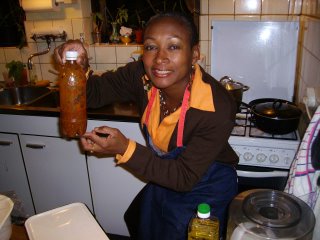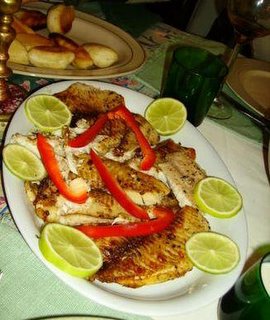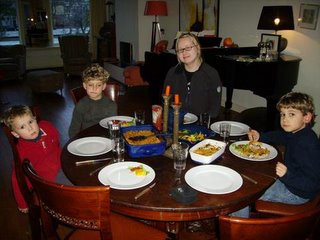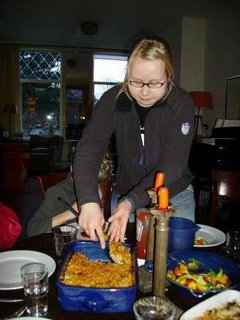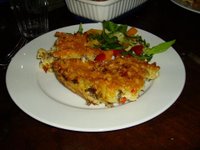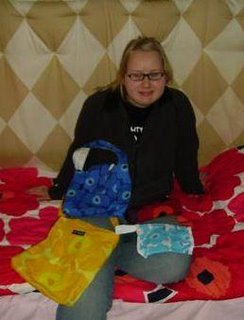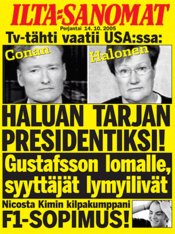 Tonight´s feast is being prepared by Anjana, a Ph.D. student from Bihar, a region in the North of India (she´s originally from a small town, Patna. Later her family moved to New Delhi and even later to Bombay). Also present is her friend Saraju, from North India as well.
Tonight´s feast is being prepared by Anjana, a Ph.D. student from Bihar, a region in the North of India (she´s originally from a small town, Patna. Later her family moved to New Delhi and even later to Bombay). Also present is her friend Saraju, from North India as well.During the preparations Anjana explains that as a Hindu, she is not allowed to eat beef, but she laughingly reasons that only the Indian cows are holy, not the Dutch, Australian or whatever the country of origin of the beef sold in the Netherlands is. She is sure it is not Indian.
For tonight´s keema with peas she visited all the supermarkets in town and none of them had ground lamb meat, so beef it is. This topic reminds me of something that happened to Irfan, another friend from Bihar. Waiting for someone at a Dutch trainstation, he was accosted by a hurried Indian, who started speaking to him in Hindi about beef. This man had come to Holland only to preach the importance of not eating beef. Irfan nodded politely and the Hindu evangelist went his way, without having asked if Irfan was actually Hindu. In fact, he is a Muslim, so the whole beef thing isn´t an issue for him.
While Anjana is preparing a treat of deep fried aubergine, she tells me about her youth. Though she is in essence a ¨city girl¨, she knows about country life, as she visited her father´s village (Farda, on the Ganges river) every year. In India the father´s village is more important than the mother´s birthplace. And in Anjana´s case, her mother´s village was difficult to get to. A full day´s travel, including a 13 km walk (difficult for small children). Her mother´s little sister would be picked up and brought to the village in a palanquin, but this deluxe treatment wasn´t available for a whole family.
I ask: ¨No donkeys to help transport the kids and the luggage?¨
Anjana laughs and answers:¨No...but before, my mother´s family had two elephants to help with the transport! But those are long dead by now...¨
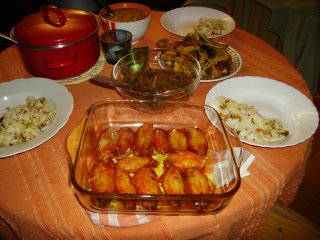 Much has changed in Indian society besides the elephants; Anjana´s mother married her father as a young girl in an arranged marriage. By now, most of Anjana´s friends follow higher education, work (at least for a while) and have a say in their future husband. However, Anjana is the first of her circle of friends to leave India to get her Ph.D. in ¨the West¨. This was a big decision, as it wasn´t the path her family would have chosen for her. Nonetheless they are very proud of her and hope that her younger sisters will follow her example.
Much has changed in Indian society besides the elephants; Anjana´s mother married her father as a young girl in an arranged marriage. By now, most of Anjana´s friends follow higher education, work (at least for a while) and have a say in their future husband. However, Anjana is the first of her circle of friends to leave India to get her Ph.D. in ¨the West¨. This was a big decision, as it wasn´t the path her family would have chosen for her. Nonetheless they are very proud of her and hope that her younger sisters will follow her example.Then Saraju arrives, bringing ice creams as a gift. Anjana protests: she feels that as they are good friends, Saraju needn´t always bring presents...she is welcome empty-handed as well!
When the aubergine is done, we take spicy chicken wings from the oven and head over to Anjana´s room. The table is completely filled with the chicken wings, the keema (ground beef) with peas, dhal (lentils), rice with veggies (boro ki saabzi) and the deep fried battered aubergine (baigan ka bachka). These last two dishes are very typical for the Bihar region of India.
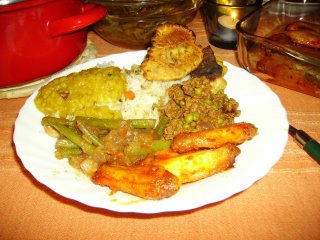 We drink red wine to go with the meal...Saraju explains that as a Brahmin (the highest caste) you are not supposed to drink from the glass. The liquid should be poured from the glass into the mouth without the two touching. This way, you can share the glass with other people. Drinking from a bottle or a glass directly is seen as a way of saying:¨This is my water!¨ and is thus very impolite.
We drink red wine to go with the meal...Saraju explains that as a Brahmin (the highest caste) you are not supposed to drink from the glass. The liquid should be poured from the glass into the mouth without the two touching. This way, you can share the glass with other people. Drinking from a bottle or a glass directly is seen as a way of saying:¨This is my water!¨ and is thus very impolite.But the Brahmin have many other rules as well. For example, younger people may not sit at a higher level than their elders in the same room. Anjana is not Brahmin, but has often visited their homes and mostly knows what not to do. Though one time she was sitting next to a Brahmin friend who kept hissing:¨Down! Down!¨ Anjana already was keeping her head down low, as is the custom, but trying to adapt she
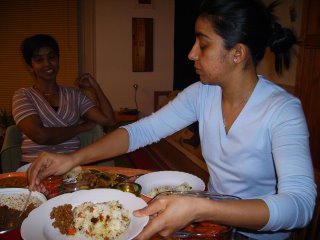 inclined her head even more, till her chin was touching her chest....and still her friend was telling her, ¨Down! Down!¨
inclined her head even more, till her chin was touching her chest....and still her friend was telling her, ¨Down! Down!¨At last, it turned out it was her leg that was supposed to be lowered, crossed legs were not comme il faut...
Though Anjana and Saraju are impressed by my eating-with-my-hand abilities, I fail miserably when I try to drink without touching the wine glass. The liquid dribbles on my chin and on my shirt. Luckily, I was smart enough to try with water, and not with the red wine!
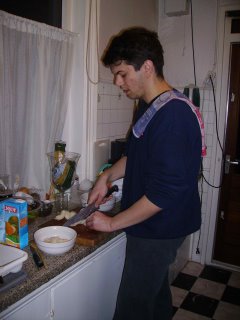
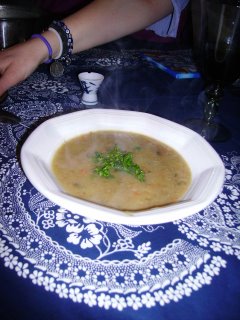

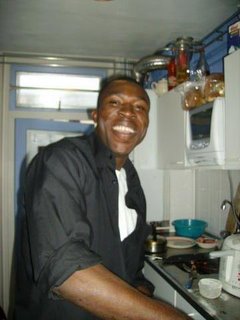
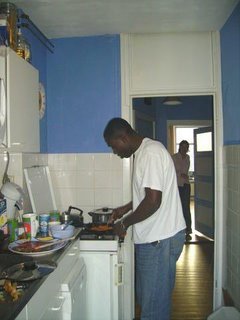
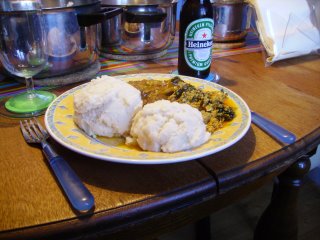
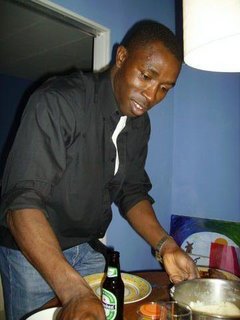
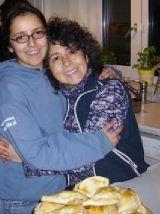 For this meal, I travel a bit further than usual: to the island of Texel. I don't have to worry about logistics; my friend Estela, who grew up in Texel, leads the way. She studies law in Amsterdam, and we met a few years ago at a summercourse on genocide and crimes against humanity. (What I was doing there? What...don' t you think veterinarians should know about genocide?)
For this meal, I travel a bit further than usual: to the island of Texel. I don't have to worry about logistics; my friend Estela, who grew up in Texel, leads the way. She studies law in Amsterdam, and we met a few years ago at a summercourse on genocide and crimes against humanity. (What I was doing there? What...don' t you think veterinarians should know about genocide?)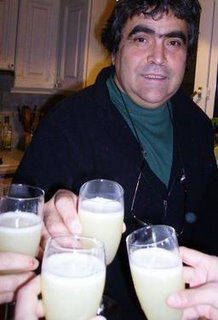
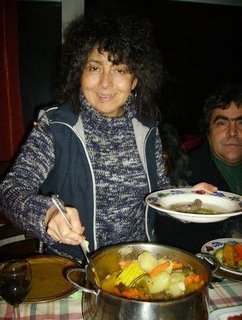
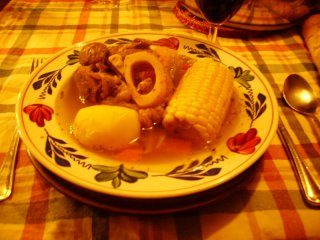
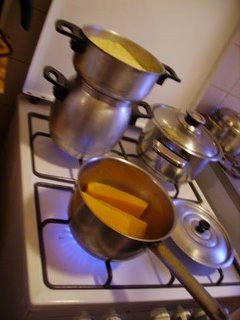
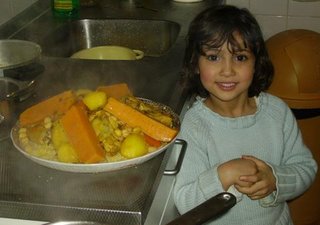
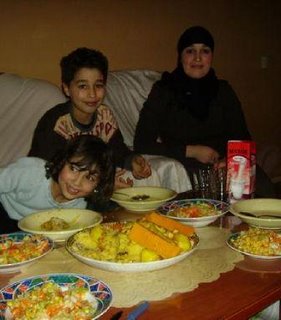
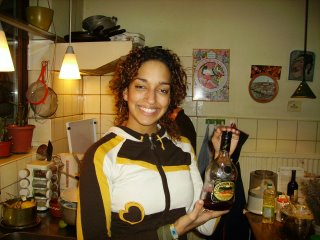 My sister Rivke and I frequently go to
My sister Rivke and I frequently go to 